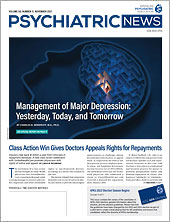FDA to Review Qelbree for ADHD in Adults
In September the Food and Drug Administration (FDA) accepted for review the supplemental New Drug Application for Qelbree (viloxazine extended-release) for the treatment of attention-deficit/hyperactivity disorder (ADHD) in adults, Supernus Pharmaceuticals announced. Qelbree was approved in the United States in April for treating ADHD in pediatric patients aged 6 to 17 years.
In a phase 3 trial of 374 adults with ADHD patients were randomized to placebo or a flexible daily dose of Qelbree starting with 200 mg and going up to 600 mg for six weeks. Compared with placebo, those who took Qelbree had a greater improvement in ADHD symptoms as measured on the ADHD Investigator Symptom Rating Scale. Those who took the drug also had a greater improvement on the Clinical Global Impression – Severity of Illness Scale at week 6 compared with those who took placebo.
FDA to Review Meloxicam/Rizatriptan Combination Drug for Migraine
The FDA has accepted for review a New Drug Application for AXS-07, a combination medication that includes 20 mg of the nonsteroidal anti-inflammatory drug meloxicam and 10 mg of the headache drug rizatriptan, for the acute treatment of migraine, Axsome Therapeutics announced in September.
In the phase 3 INTERCEPT trial, 302 patients received either a single dose of AXS-07 or placebo at the earliest sign of migraine pain, when pain was mild. Two hours after dosing, 32.6% of those who took AXS-07 were free from migraine pain, compared with 16.3% who took placebo. Among those who took AXS-07, 43.9% were free of their most bothersome symptom, such as nausea or sensitivity to light, two hours after dosing, compared with 26.7% in the placebo group.
In the phase 3 MOMENTUM trial, 1,594 patients were randomized to take AXS-07, 10 mg of rizatriptan, 20 mg of meloxicam, or placebo to treat a single moderate or severe migraine attack. Two hours after dosing, 19.9% of patients who took AXS-07 reported significant improvements in freedom from pain, compared with 6.7% who took placebo. In addition, 36.9% of those who took AXS-07 reported the absence of their most bothersome symptom two hours after dosing, compared with 24.4% who took placebo.
Phase 2 Trial Starts for BNC210 for Social Anxiety Disorder
Bionomics Limited will soon launch a phase 2 trial of the drug BNC210 for the treatment of social anxiety disorder, the company announced in September.
A previous in-clinic phase 2a study in patients with generalized anxiety disorder found that a single dose of the drug in liquid form showed significant anti-anxiety signals as measured in brain imaging and behavioral studies, but without evidence of sedating patients or becoming addictive. However, the slow absorption of the liquid suspension formulation of BNC210 and the requirement for it to be taken with food for optimal absorption would limit its use in "real world" situations for the acute treatment of anxiety, so the company developed a new solid dose tablet formulation of the drug to use in the phase 2 trial of patients with social anxiety disorder.
The drug currently has fast track designation for the treatment of posttraumatic stress disorder and other trauma-related and stressor-related disorders.
Caplyta Shows Promise for Bipolar Depression
A phase 3 trial of Caplyta (lumateperone) suggests the drug is safe and effective at reducing depressive symptoms in patients with bipolar I or bipolar II disorder who are experiencing a major depressive episode, Intra-Cellular Therapies announced in September.
In the trial, the results of which are published in the American Journal of Psychiatry, 381 patients with moderate to severe depression symptoms were randomized to receive placebo or 42 mg of Caplyta daily for six weeks.
Compared with those who took placebo, patients who took Caplyta experienced greater relief of their depressive symptoms as evidenced by greater improvement on the Montgomery-Åsberg Depression Rating Scale Total Score, with differences between the two groups becoming apparent as early as one week into the trial. Those who took Caplyta also experienced statistically significant improvement on the Clinical Global Impression Scale for Bipolar Severity. Additionally, the rate of side effects in participants taking lumateperone was similar to that of the placebo groups. ■
